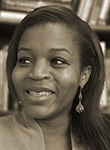Dedicated to the memory of Thomas B. Gay, educator, painter, poet, friend.
(read more about Thomas B. Gay)
Each spring we use this reading loop to bring to your attention writers and artists whose work you may be encountering for the first time. In this issue, the group includes several who have already made their way to other lists, anthologies, and small presses acclaiming their remarkable work. We expect that you will be glad to discover them now—and to hear of them again later in their careers, as you no doubt will.
| Elvira Basevich | ||
| In Elvira Basevich’s poems, despair looms like a clock, meting out the years of a weary (or will-be-weary) speaker. “And who really wants all this misery? / Even a poet eventually tires of it,” Basevich’s poems ask. Loss sears, but her grief remains fettered by the desire for the world to change, to become what it is not. Her vision resists a parody of hardship, but expects hardship. Unflinchingly, she proves the gravity of living, but manages to remind us that hope can be measured by degrees. |  |
|
| Sonal Kohli | ||
| Sonal Kohli’s “10 Bela Road” presents a puzzling “mix of Indian and English sensibilities” as the narrator attempts to make peace with her mother’s insistence on selling the family home to preserve their posh lifestyle after the death of her father. Even the spoiled family dog “lifts her head and winks at the biscuits” during tea on the veranda. Forced to move on from loss, Kohli’s narrator is trapped in a room full of grief, “afraid it would be like living in a box, and like a rat one would always be trying to climb out.” |  |
|
| James Leech | ||
| As mobs take to the streets of a dystopian London, James Leech’s “A Riot” narrates the resulting nihilism in a story that seems to take place in a parallel, but porous, time and space. Set in an unremarkable apartment among largely featureless friends, the story observes the fear generated by “constant access to the news.” From the shadows of the streets, a boy’s hand reaches toward a “stranger’s stretched out throat,” if only for “the power and responsibility that come with being so near to another human.” |  |
|
| Kwoya Fagin Maples | ||
| Kwoya Fagin Maples’s sonnet sequence confronts the enslavement of the black female form by examining the 1845 experiments in fistula surgery by Alabama doctor James Sims. The polyphonic nature of the poem gives voice to enslaved women whose bodies were operated on without their consent, who “imagine a sweeter history / and more hope than you could ever allow.” Maples attempts to free the women from captivity as she gives voice to them collectively and symbolically: “We are rotting fruit, yet our bodies yield.” |  |
|
| Emily Nemens | ||
| Emily Nemens’s “After Incus” follows ornithologist Dr. Armin Hadžić as he travels from Sarajevo to Cincinnati in 1914 to breed the last two living passenger pigeons. With dulcet prose and a probing narrator, Nemens explores the peril and consequences of empire and the risks of leaving home as Dr. Hadžić’s plans unravel with the onset of World War I. He, like his vanishing birds, falls under the shadow of the impersonal onslaught of history. “Was this my punishment?” he wonders. |  |
|
| Melissa Stephenson | ||
| Sourced from the restless years of childhood and adolescence, Melissa Stephenson’s micro-essays remind us that wisdom is earned over time, and that no amount of introspection—whether in the moment or after the fact—makes up for our woefully limited perceptions. Stephenson offers quick flashes of wonder and teenage irritation, but each of these also celebrates the post hoc realization of innocence: “I don’t see it then. I can’t.” Stephenson underscores her speaker’s naïveté with a hint of nostalgia—a twist on the familiar desire to shun the darker discoveries of adulthood. |  |
|
| Chioma Urama | ||
| Chioma Urama’s poetry suspends the colonization of language with images of black bodies as casualties of a racially divided America. Her poem “Blue” bears witness to “the pastoral violence of Virginia childhood,” while the poem “poli—” is an ekphrastic meditation on a Basquiat sketch where “the half word scrawled below leans right which / graphology reveals as a loss of logic.” Urama’s work uses physical space as metaphor, and begs the question: “None of it makes any / sense; where is the body supposed to go?” |  |
|
Introductions texts appear in different sections of Blackbird but are organized in this alternative menu, a featured reading loop allowing easy navigation of related material.
A link to this “Introductions Reading Loop” menu appears at the bottom of every Introductions-related
page. You may also return to this menu at any time by visiting Features.